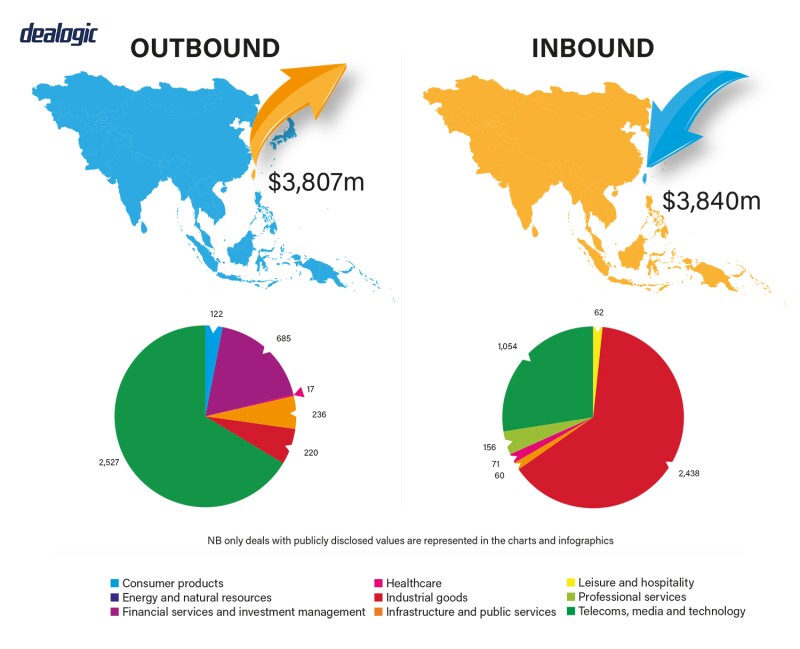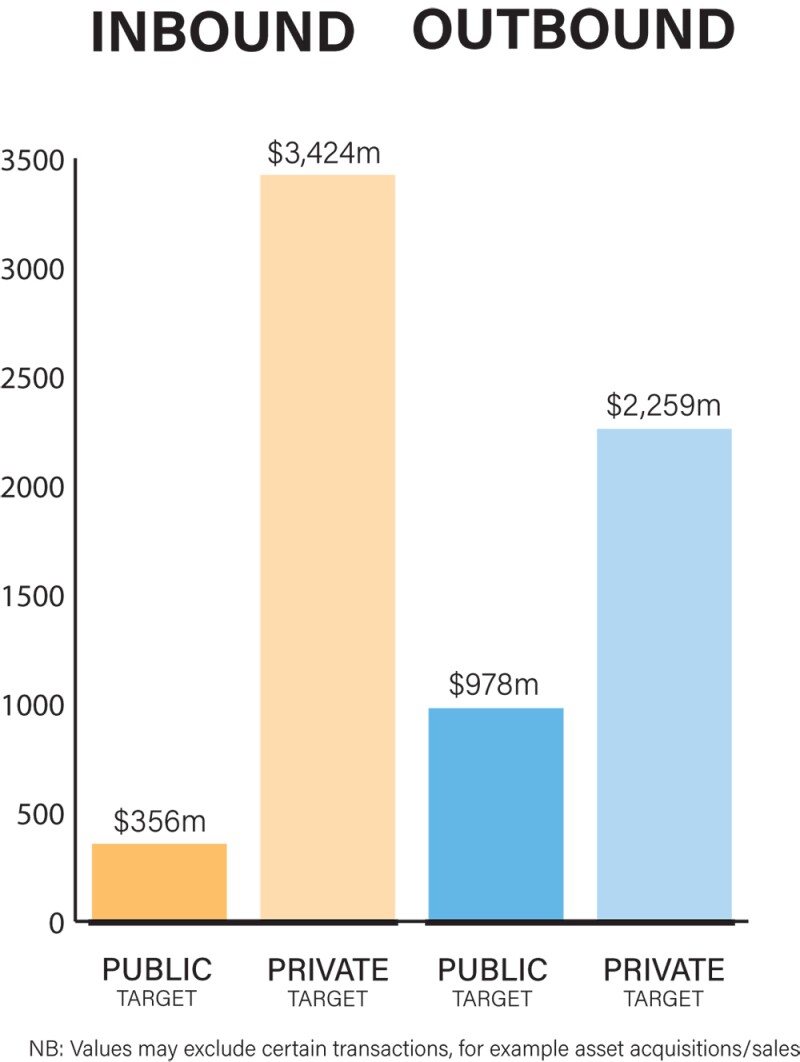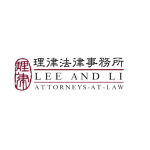Green energy continues to be a hot topic in the market in 2021. Orsted completed the sell-down of its first offshore windfarm and Copenhagen Infrastructure Partners announced the transfer of a portion of the shares in one of its windfarms to Global Power Synergy Public Company of Thailand. Investors’ interest in solar energy projects also fuelled the M&A market.
Aside from the energy sector, there have been a number of consolidations of retail chains in recent years. Similar to past years, sales of financial institutions are high-profile transactions and created discussions between legal practitioners and regulators.
Both private and public M&A transactions drive the M&A market in Taiwan. While there were a few notable public M&A transactions in 2020 and 2021, there have been quite a few private M&A transactions in the market as well. For example, there have been several acquisitions in the energy sectors, and smaller M&A deals for emerging technology companies.
However, there may have been fewer investments by Mainland China investors or Mainland-China-invested companies in Taiwanese companies through M&A due to the change of political climate and the sensitive cross-strait situation.
Two high-profile fights over the management power of listed companies involved Tatung Co and Solar Applied Materials Technology. Taiwan’s regulators, through taking administrative actions and revising relevant regulations, conveyed messages to the market that improper defensive measures would not be accepted in hostile takeover deals.
Tatung, a company listed on the Taiwan Stock Exchange (TWSE), has been the subject of proxy fights for years. While the company had been managed by the founder’s family, a number of investors have publicly declared their interest in taking over control of the company.
At its 2020 annual shareholders meeting, Tatung announced that approximately 53% of the shares, all of which were owned by public shareholders, were excluded from voting on matters discussed at the meeting, including the election of directors, on the ground that those shareholders were backed by funds from Mainland China and therefore the shares were held in violation of the restrictions against Mainland China investments.
At the end of the meeting, Tatung announced that six directors and three independent directors nominated by Tatung were all elected. Immediately after the meeting, the regulators, including the Ministry of Economic Affairs (MOEA) and Financial Supervisory Commission (FSC) voiced their concerns over Tatung’s measures for excluding public shareholders from voting.
The other side of the proxy fight eventually took over control over Tatung at a special shareholders meeting that they convened with the approval of the MOEA. In 2021, the Taiwan Taipei District Court rendered a judgment holding that the chair at the time of the annual shareholders meeting should be discharged from directorship due to the inappropriate and illegal measures that she took to exclude the public shareholders.
At a board meeting in November 2011 of Solar Applied Materials Technology, a company listed on the Taipei Exchange, the board resolved to discharge the chairman of the board through an ad hoc motion. The management shareholders claimed that this ad hoc motion was against the rules applicable to public companies and that the discharge was null and void.
As a result, there were two individuals claiming to be the chairpersons of the company. The independent directors supported by different sides of the fight both invoked provisions under the Company Act and attempted to convene two separate special shareholders meeting with the scheduled meeting dates being four days apart.
The court, citing public interest, banned both sides from convening a special shareholders meeting. To prevent independent directors from getting involved in similar fights/disputes in the future, the FSC requested the Taiwan Stock Exchange to amend the relevant rules to the effect that the consent of the audit committee must be obtained before minority shareholders of a listed company can convene a special shareholders meeting.
Economic recovery plans
In 2021, M&A transactions in Taiwan were hardly affected by Covid-19 partly due to the government’s effective response to the pandemic. However, we have observed that there has been a lower volume of investments from Japan, and we surmise that this trend is due to Japanese investors’ practices in performing on-site due diligence and in-person negotiation in dealing with M&A transactions.
While the MOEA has not yet published the statistical analysis of M&A deals for Q4 of 2021, according to the MOEA’s analysis of Q1 to Q3, the total value of announced deals was $346 million with a deal count of 97, while the total value of announced transactions in the same period in 2020 was $279.6 million, with a deal count of 130.
As indicated above, given that Japanese investors are more prudent with following their practices in performing on-site due diligence and in-person negotiation in M&A deals, if the pandemic and the quarantine policy continue, we envisage that the trend of decreased investment from Japan will remain in 2022.
On the other hand, in the renewable energy sector, in view of the Taiwanese government’s policy to promote green energy, we expect growth of M&A transactions pertaining to the investments in the investors/developers of offshore wind, solar energy project, and other renewable energy companies. It is expected that M&As in 2022 will mainly follow the 2021 pace.
There have been several driving forces in the structuring of M&A deals in Taiwan. For example, given that the recently amended M&A Act (2016) allows for more flexibility in terms of the form of the consideration that an acquirer may offer to the shareholders of a target company, it should be easier for an acquirer to achieve a 100% equity interest acquisition.
|
|
“There could be a trend for Taiwan-based companies to seek the opportunity for IPO in the US market through de-SPAC” |
|
|
This was evidenced by the increasingly popular cash-out share exchange structure in 2018 and 2019. In 2020 and 2021, the slowing down of major transactions appears to reflect public calls for more stringent disclosure and voting requirements for cash-out deals and de-listings.
Meanwhile, the Taiwan government promulgated amendments to laws and regulations governing Mainland China investors’ investment in Taiwan to prevent the circumvention of the investment control. For example, according to the amendments, (i) stricter criteria were adopted for identifying Mainland China investment made through a third-area intermediary, and (ii) Mainland China investors wishing to control a Taiwanese company (other than those listed on the TWSE or Taipei Exchange or traded over the Emerging Market of the Taipei Exchange) via contractual arrangement are also required to apply for regulatory approval. This means transactions must be carefully structured to meet the requirements applicable to Mainland China investors for making investments in Taiwan.
During the last decade, big-ticket M&A in Taiwan has been mostly driven by strategic investors. Financial investors have mostly participated in M&A as co-investors or as acquirers of minority stakes in companies.
Since 2018 however, there has been a booming trend of financial investors returning to the market after being silent for almost a decade. A series of deals, including KKR’s take-private acquisition of LCY, Morgan Stanley’s take-private acquisition of Microlife, Blackrock’s acquisition of a solar portfolio and Permira’s investment into aquaculture company Grobest, were all led by private equity funds.
Although we did not see this trend of financial investment continuing after 2019, there were still several transactions initiated by private equity funds in 2020 and 2021, such as the take-private acquisition of On-Bright by Magicapital, Pavilion Capital and Axiom Capital in 2020 and the take-private acquisition of Ginko by Baring Private Equity Asia in 2021.
In response to the Taiwanese government’s ambitious effort to promote renewable energy, M&A transactions in the energy sector continue to thrive in 2021. These are largely driven by foreign and local financial investors. The notable examples are several sell-down of offshore wind farm developers, as well as a number of large-to-mid-size investments in the solar power plant industry. We also see quite a few global asset management firms continuing to be involved in building and acquiring Taiwan’s internet data centres.
Additionally, in 2021, Gogoro and Gorilla Technology Group both went public on Nasdaq through mergers with special purpose acquisition companies (SPACs). There could be a trend for Taiwan-based companies to seek the opportunity for initial public offering (IPO) in the US market through de-SPAC, and we expect to see a few de-SPAC transactions in 2022.
Legislation and policy changes
The main statutes governing M&A activities in Taiwan are the M&A Act, the Company Act, the Securities and Exchange Act, and the Fair Trade Act. In addition, under the Securities and Exchange Act, a set of tender offer rules are prescribed to govern tender offers for acquiring shares of public companies. Other statutes may also be relevant, for example the Labour Standards Act, foreign and Mainland China investment regulations and tax laws and regulations.
The main regulatory body in charge of public M&A transactions is the Securities Futures Bureau (SFB) of the FSC, which is the government agency responsible for public companies. The other relevant regulatory bodies include the Fair Trade Commission, the authority in charge of anti-trust clearance, and the Investment Commission, the authority in charge of reviewing foreign and Mainland China investments. If the target holds any special licence, the authority in charge of that special licence may also need to review the transaction.
After the latest amendments to the Company Act took effect in November 2018, shareholders holding over 50% of shares are permitted to call a shareholders’ meeting, without needing the board to call such a meeting. This allows insurgent shareholders to replace the incumbent board as soon as the insurgent shareholders acquire a majority stake. This is worth noting for hostile takeovers.
In December 2021, Taiwan’s Executive Yuan (the cabinet) submitted the draft amendments to the M&A Act to the Legislative Yuan (the parliament) for review and approval. The draft amendments focus on improving the flexibility of M&A while also protecting the shareholders’ rights. The key proposed amendments include:
(a) Enhancing the disclosure before the shareholders’ meeting: under the current laws, the directors’ personal interests and the reasons for approval or dissent to the resolution of merger or acquisition should be explained at the board meeting and the shareholders’ meeting. The draft amendment requires that such information be further stated on the shareholders’ meeting notice so that the shareholders are informed ahead of the meeting.
(b) Enhancing the mechanism of appraisal right: under the current laws, to exercise the appraisal right, the dissenting shareholders need to abstain from voting. The draft amendment allows the dissenting shareholders to choose to vote against the proposal (instead of abstaining) and exercise the appraisal right.
(c) Expanding the scope of the ‘asymmetric M&A’: asymmetric M&A, where a company acquires a significantly smaller target, is only required to be approved by special resolution by the board, currently including when (i) the new shares issued by the merging company is not more than 20% of its voting shares or (ii) the consideration paid by the acquirer does not exceed 2% of the book value of the target. To enhance the flexibility and efficiency of M&A, the amendment allows more room for approval by special resolution by the board by amending the threshold in the case of (ii) above from 2% to 20% of the book value.
Due to the environmental, sustainable and corporate governance (ESG) advocacy and promotion of ESG awareness in society, there is growing demand for green energy. Large companies, especially manufacturers, have initiated relevant discussions with private power plants for procuring green energy. However, we have not seen any ESG-related discussions that have transformed the way that M&A is conducted in Taiwan.


Market norms
Information disclosure and insider trading are important and sensitive areas for public companies in Taiwan. However, local management sometimes underestimates their importance and fails to make the proper disclosures. In many instances, large public M&A transactions crossed red lines as regards insider trading and quite a few criminal investigations have been launched.
There have been many attempts to manipulate the stock prices of listed companies, or to intentionally buy/sell the shares of the target company by the management before the information is legally and properly disclosed to the market in order to reap improper gains. A few notable deals in recent years were reported to have involved insider trading issues.
This type of misconduct harms the buyer’s trust and if, for example, the price goes up unreasonably before the information disclosure, the buyer might ask for a cooling-down period or even choose to halt the transaction.
In light of these concerns, public companies need to pay more attention to information disclosure when they plan M&A transactions. This includes understanding what information should be disclosed and the proper timing for disclosing certain pieces of information to the market. Most important of all, public company insiders should not trade any shares in the public company before proper information disclosure. Professional advice should be sought regarding this issue.
In Taiwan, M&A transactions are often subject to regulatory approvals, such as foreign investment approvals or Mainland China investment approvals. For those industries that are required to hold a special licence/permit, such as banks, securities firms and insurance companies, approval from the competent authority, such as the FSC, needs to be obtained in advance. Meanwhile, any M&A transaction triggering the pre-closing antitrust filing threshold needs to obtain antitrust clearance before closing.
Given all these requirements, whether and how regulatory approvals can be smoothly obtained is a critical issue to the completion of an M&A transaction in Taiwan. As such, it is advisable that investors intending to conduct an M&A transaction in Taiwan seek professional assistance in advance, in order to better understand the regulatory requirements and application process.
In local practice, it is very common to conduct legal due diligence investigations for M&A deals by accessing documents and files stored in virtual data rooms, without the need for the potential acquirers to carry out onsite due diligence in the target’s physical location.
As to the use of emerging technologies, in Taiwan, there have been some discussions regarding how new technologies, such as artificial intelligence, could support legal practice, including M&A transactions. However, these new technologies are still not commonly seen in Taiwan in M&A transactions.
Public M&A
Given that under the Taiwan Company Act, material decisions require the approval from shareholders holding two-thirds of the voting shares present at a meeting, in order to gain an absolute control of a public company, an acquirer should aim to acquire or control at least 67% of the shares.
In practice, given that not all shareholders attend shareholder meetings, to control the management or operation of a listed company, it is sometimes enough for one investor to control 30% to 40% of the voting rights in a listed company. In sum, this would largely depend on the shareholding structure of the listed company.
In local practice, the conditions of a tender offer usually include the minimum and maximum number of shares that the shareholders of the target company agree to tender during the tender offer period; the tender offeror obtaining the required government approvals, if any (such as antitrust clearance and foreign investment approval); and no occurrence of any material adverse event (subject to the approval of the FSC).
After the XPEC case, the FSC amended the relevant tender offer regulations in 2016 to increase scrutiny and enhance transparency in tender offers. Specifically, under the amended tender offer regulations, a tender offeror must prove its ability to pay the tender offer consideration. Such proof can be in the form of either a bank guarantee, a report from an independent financial adviser or a certified public accountant attesting to the offeror’s ability to pay the tender offer consideration.
In terms of tender offers and other types of M&A transactions between public companies, we have rarely seen break fee arrangements in Taiwan deals.
Private M&A
Large private M&A transactions often adopt a completion accounts mechanism under which the purchase price is adjusted in accordance with the post-closing audit of the financial status of the target company, as at closing date. For transactions with a smaller value, it is more common for the parties to adopt the locked-box mechanism, which has become more and more popular in recent years. Earn-out mechanisms and escrow arrangements are commonly seen in private M&A transactions.
The customary closing conditions attached to a private takeover offer usually include that the seller’s representations and warranties remain true and correct; that the required government approval (if any) has been obtained; that required third party consent (if any) has been obtained; that no material adverse event has occurred; that no action or government order is seeking to deter or enjoin the proposed M&A transaction; and that other commercial arrangements required by the parties have been completed or achieved (this would usually be structured based on the due diligence findings).
If any party in a private M&A transaction belongs to a foreign corporate group, that party would normally require that the transaction documents be governed by the law of the foreign country where the headquarters of the foreign corporate group is located. Any dispute arising from the transaction documents will then be resolved via the court of a foreign jurisdiction or an arbitration proceeding conducted outside Taiwan. Local parties would normally accept such arrangements.
The IPO market in Taiwan is generally perceived as serving the purpose of fund-raising rather than exiting, due to lock-up requirements, minimum shareholding requirements, legal requirements and limitations on selling shares that are applied to major shareholders, directors and supervisors.
For the major shareholders of a public company that wish to sell their shares to a potential buyer, a mandatory tender offer may be triggered if more than 20% of the shareholding will be transferred within 50 days. Consequently, major shareholders’ exit in the open market may be treated as a trade sale. In recent years, due to factors such as the low price-to-earnings ratio of the Taiwan stock market and the strong performance of other stock exchanges in Asia, the Taiwanese IPO market has been slow. This is another reason why major shareholders usually would not consider a Taiwanese IPO as an exit priority.
However, trade sales or sales to financial sponsors have always been a major exit route. Other than highly regulated industries (such as media or cable TV) or acquisitions involving Mainland China funding, there should be no substantial hurdle for an exit, even though the regulatory approval process may sometimes take a long time.
As for highly regulated industries and investments involving Mainland China funding, the Taiwanese government has been criticised for the prolonged regulatory approval process and lack of transparency in its decision-making process.
Looking ahead
Considering the current government’s conservative attitude towards Mainland China investment (specifically the newly amended investment regulatory scheme for Mainland China investors as indicated above), we do not expect major transactions involving Mainland China funding to take place in Taiwan.
Given that investments made by Mainland China investors through the ‘control via contract’ structure (e.g., variable interest entity structure) also require regulatory approval under the amended scheme, it is anticipated that there will be more inquiries regarding the alternative structures to achieve cross-strait collaboration.
Seeing that the Taiwanese government continues to promote renewable energy, we expect that M&A transactions in the energy sector will continue to thrive in 2022. We also expect to see a few de-SPAC transactions in 2022.
Click here to read all the chapters from the IFLR M&A Report 2022

Yvonne Hsieh
Senior counsellor
Lee and Li, Attorneys-at-Law
T: +886 2 2763 8000 ext. 2188
Yvonne Hsieh is a senior counsellor at Lee and Li. Her practice focuses on M&A, international investment, securities and antitrust.
Yvonne has assisted many foreign companies in acquiring and privatising listed companies, including the recent acquisition of a Taiwan chemical company conducted by a PE fund. She is also an expert on antitrust and has been recognised by guides as being among the world’s leading competition lawyers since 2013.

Eddie Chan
Partner
Lee and Li, Attorneys-at-Law
T: +886 2 2763 8000 ext. 2139
Eddie Chan is a partner at Lee and Li and co-leads the firm’s M&A practice group.
Eddie has exposure to a wide range of clients from different industries and provides advice on various complex acquisitions. He is also specialised in Mainland China investment projects in Taiwan. He recently advised private and state-owned Mainland China companies on investment projects in Taiwan. Eddie has been ranked by international guides as one of the leading M&A lawyers in Taiwan.

Patricia Lin
Senior counsellor
Lee and Li, Attorneys-at-Law
T: +886 2 2763 8000 ext.2235
Patricia Lin is a senior counsellor at Lee and Li. Her practice focuses on banking, securities, capital market, financings – particularly, structured and aircraft financing – and M&A.
Patricia has worked on many international capital market offerings (depositary receipts, external commercial borrowings and Formosa bonds). She is an M&A expert in both general and highly regulated financial and telecom industries. She advised on the first Mainland China investment in the LED industry.

Cheng-Chieh (James) Huang
Partner
Lee and Li, Attorneys-at-Law
T: +886 2 2763 8000 ext.2157
Cheng-Chieh (James) Huang is a partner at the banking and capital market department of Lee and Li, with principal practice areas in banking, capital market and M&A.
James has represented clients in various high profiles M&A transactions. He also advises local and international banks, securities firms, insurance companies, financial holding companies and other financial institutions on matters including syndicated loans, acquisition finance and project finance.





